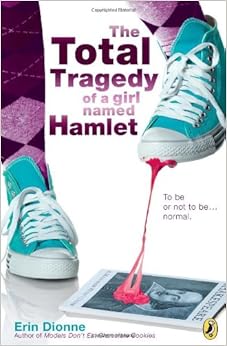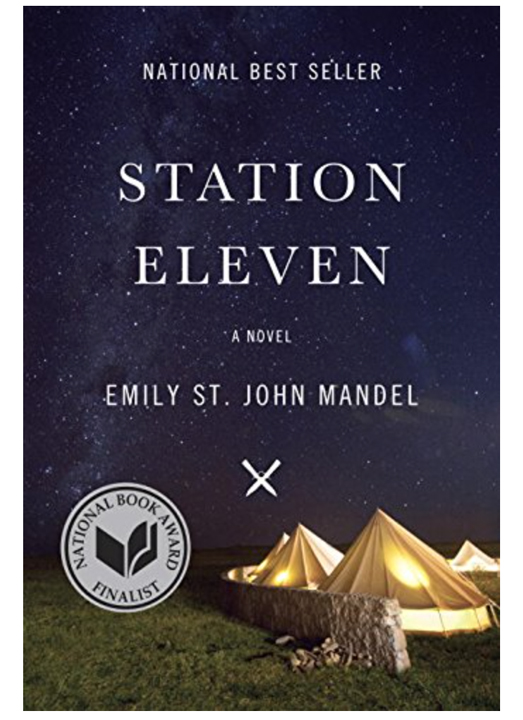Dionne, Erin (2010) The Total Tragedy of a Girl Named Hamlet. New York: Puffin.

Opening line: "I hadn't figured out a way to stop time, join the circus, or make myself invisible."
Hamlet Kennedy has a difficult life. She is in eighth grade, her name is Hamlet (courtesy of her Shakespeare-obsessed parents), her younger sister Desdemona is joining her in middle school (courtesy of the fact that she is a genius) and seems to be having an easier time getting to know the popular kids, her parents have volunteered to make a presentation about Shakespeare in her English class in full Elizabethan dress (courtesy of the fact that they are English professors), and finally, there is this boy she likes (and you can imagine how that is going). Hamlet's other problem is her English teacher keeps nagging her to read aloud in class, which Hamlet finds embarrasing. How can she possibly escape all these potential doom scenarios?
To tell the truth, when I first saw this book, I envisioned that it would be some version of the play Hamlet, only with a female protagonist and somehow updated to a modern school. It isn't. But it still would be a valuable book for those interested in Shakespeare to read. It is more about a kid who learns to appreciate Shakespeare far more deeply than she ever thought she might. And Hamlet Kennedy does discover that she has a talent for reading out loud and acting. This theme of discovery is a good one, especially for middle school students.
This book is suitable or middle school and early high school. These was nothing in here that I thought would offend anyone. It is a fun read, but there is probably not enough thematically here to justify using it as part of the curriculum. Excellent addition to a classroom library, though.
Mandel, Emily St. John (2014) Station Eleven. New York: Vintage.

Opening lines: "The king stood in a pool of blue light, unmoored. This was act 4 of King Lear, a winter night in the Elgin Theater in Toronto."
This isn't a children's book. It isn't really a young adult novel either, but it is a book that high school students can read and will love and one that is easily paired with King Lear or other Shakespearean plays.
It starts on a stage in Toronto, where we meet Arthur Leander, a famous film actor who has returned to the stage to play King Lear. Arthur will have a heart attack and die on stage on the same night that an outbreak of a pandemic flu will begin sweeping the globe, killing most of the humans on the planet. A few chapters later, the book will start again, this time with Miranda who is on the South coast of Malaysia when the epidemic begins claiming lives. Miranda is on assignment for the shipping corporation that employs her. We also find out that in every spare moment after work, Miranda is drawing a comic book about Doctor Eleven, who lives on a damaged space station of his own design. And two chapters after that, the book starts again, this time with Kirsten, an actor who plays with a travelling theater and orchestra many years after the plague, wandering the decaying highways of Michigan, performing for the little towns that have sprung up. When they arrive at one such town, where Kirsten's friend and her husband had dropped out of the travelling symphony to raise a family, Kirsten finds her friend is nowhere to be found and the townspeople are strangely tight-lipped about the matter.
And from there we are swept into a story that moves forward and backward in time, slowly revealing connections between these characters and also telling the history of the world before and after the pandemic. There are several plots in the midst of this, all of them compelling and despite the apparent disjointedness of those plots, it all come together nicely in the end.
Someone more gifted than I am can perhaps do some thinking about ways in which the plots connect to Shakespeare, but I can tell you that it manages, like the best of Shakespeare's plays, to follow a few little lives and somehow convey an epic sweep of action. I can also tell you that Mandel is an excellent writer and not only constructs a completely believable world within the book (several actually), but also does so with beautiful attention to the sound of the words she uses. Some chapters seem downright poetic.
As I said, this would be a good novel for high school. There are some references to sex and one relatively minor gay character, and a bit of violence, but if this were a film, I imagine it would be PG 13. I doubt it would be challenged. My brother uses this one in the high school English class he teaches and says it works very well. It would also be good for your classroom library and might work as a read-aloud.
Regardless of whether you use it or not, though, you will enjoy reading this one. Go buy it.
Lu, Marie (2014) The Young Elites. New York: Putnam.

Opening lines: "I'm going to die tomorrow morning. That's what the Inquisitors tell me, anyway, when they visit my cell. "
Adelina Amouteru was exposed to the blood fever when she was young. It scarred her face and body, turned her hair silver, and also gave her mysterious powers. After she killed her abusive but economically powerful father she attracted the attention of the Inquisition and new she is sentenced to die. On the day of her execution, though, she is rescued by the Young Elites, a secret society of people like her dedicated to rescuing other paranormals and bringing down the oppressive rule of the king and his Inquisitors. Adelina feels attracted to the leader of the Young Elites, Enzo, but at the same time, the leader of the Inquistors, Toren Santoro has a powerful hold over her as he has imprisoned her little sister. Eventually, Adelina is presented with the choice of whether to use her powers to help the Young Elites or to ally herself with the Inquisiiton.
And the choice she faces might sound familiar (Anikin Skywalker, Luke Skywalker, Richard the Third, Neo from The Matrix, and so on). It is a classic being-tempted-by-the-dark-side kind of a narrative. Such a choice can end with the protagonist choosing the good side (Luke, Neo) or the dark side (Anikin, Richard) but what makes the story interesting is usually the struggle of their choice. Anikin and Richard, for example, are pushed by circumstances toward a dark choice. Anikin fights against it. Richard embraces it, but also spends some time justifying it (as Shakespeare's villains do). Luke and Neo are sorely tempted, but manage to stand strong.
Adelina struggles with both sides, but as I read it, doesn't so much make a decision as have it decided for her. Perhaps this is saying something about the nature of a woman's choices in her world. For me as a reader, though, it so eroded my ability to care about her as a character that by the end I didn't much care for her or the book. This may have just been my take as a reader, and so you may want to check it out yourself (it is a fairly popular series). Though I had hoped I might be able to use it in my class (to pair with Richard III,) I don't think this book would lend much to such a conversation.
This book would be best for high school. There are some fairly passionate love scenes and one of the main characters is a bisexual courtesan. This might cause the book to be challenged. Frankly, though, I wasn't impressed enough to even consider fighting for it.
You are certainly welcome to read it yourself, of course, and set me straight.
No comments:
Post a Comment